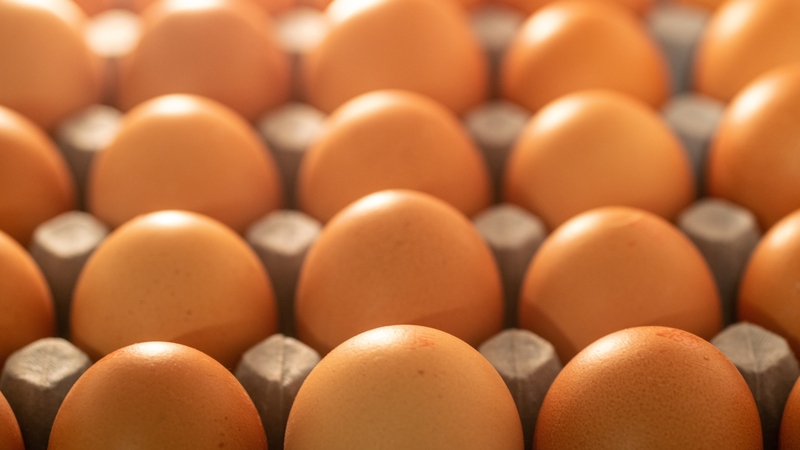
Free range eggs are no longer available on UK supermarket shelves, as the "largest ever outbreak" of bird flu has kept hens inside for months.
Updated / Tuesday, 22 Mar 2022
Free-range eggs are no longer available on UK supermarket shelves, as the "largest ever outbreak" of bird flu has kept hens inside for months.
UK-wide measures to tackle the outbreak of avian flu were introduced in late November 2021, with bird keepers legally required to house poultry indoors, such as in large barns for commercial flocks.
Farmers who have to house their birds to protect human and animal health under government rules are allowed to keep the free-range status for eggs for 16 weeks, a grace period which expired yesterday.
That means eggs sold in the UK will now have to be labelled as "barn eggs" and not free-range, until the mandatory housing measures are lifted.
Free-range egg packaging has to have stickers or labels marking them as "barn eggs", and supermarkets have to display information in-store and online to tell consumers what is happening and why.
An Environment Department (Defra) spokesperson said: "We are experiencing our largest ever outbreak of avian flu and housing measures remain in force to protect poultry and other birds from this highly infectious and unpleasant disease.
"We continue to provide support for the poultry sector throughout this challenging time.
"The 16-week grace period we allowed for free-range eggs has now been exceeded, and eggs must now be marketed as 'barn eggs'.
"We have worked closely with the sector and retailers to implement these changes as smoothly as possible."
National Farmers’ Union chief poultry adviser Aimee Mahony said that government advice was that there was still a high level of risk to birds from avian flu, which meant all birds must remain indoors until further notice.
"This is an incredibly difficult time for all bird owners and vigilance remains vital.
"Poultry farmers continue to do all they can to ensure the health and welfare of their flocks, including following stringent biosecurity measures and adding additional enrichments to the bird’s environment such as pecking blocks and dust baths.
"Shoppers may notice different labels on egg packs as well as point-of-sale information explaining that the eggs have been laid by hens temporarily housed to protect their health and welfare.
"Once the risk levels have reduced and the housing measures have been lifted by Defra, birds will be able to go outside again," she said.
Updated / Tuesday, 22 Mar 2022
Free-range eggs are no longer available on UK supermarket shelves, as the "largest ever outbreak" of bird flu has kept hens inside for months.
UK-wide measures to tackle the outbreak of avian flu were introduced in late November 2021, with bird keepers legally required to house poultry indoors, such as in large barns for commercial flocks.
Farmers who have to house their birds to protect human and animal health under government rules are allowed to keep the free-range status for eggs for 16 weeks, a grace period which expired yesterday.
That means eggs sold in the UK will now have to be labelled as "barn eggs" and not free-range, until the mandatory housing measures are lifted.
Free-range egg packaging has to have stickers or labels marking them as "barn eggs", and supermarkets have to display information in-store and online to tell consumers what is happening and why.
An Environment Department (Defra) spokesperson said: "We are experiencing our largest ever outbreak of avian flu and housing measures remain in force to protect poultry and other birds from this highly infectious and unpleasant disease.
"We continue to provide support for the poultry sector throughout this challenging time.
"The 16-week grace period we allowed for free-range eggs has now been exceeded, and eggs must now be marketed as 'barn eggs'.
"We have worked closely with the sector and retailers to implement these changes as smoothly as possible."
National Farmers’ Union chief poultry adviser Aimee Mahony said that government advice was that there was still a high level of risk to birds from avian flu, which meant all birds must remain indoors until further notice.
"This is an incredibly difficult time for all bird owners and vigilance remains vital.
"Poultry farmers continue to do all they can to ensure the health and welfare of their flocks, including following stringent biosecurity measures and adding additional enrichments to the bird’s environment such as pecking blocks and dust baths.
"Shoppers may notice different labels on egg packs as well as point-of-sale information explaining that the eggs have been laid by hens temporarily housed to protect their health and welfare.
"Once the risk levels have reduced and the housing measures have been lifted by Defra, birds will be able to go outside again," she said.
No comments:
Post a Comment